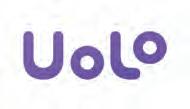
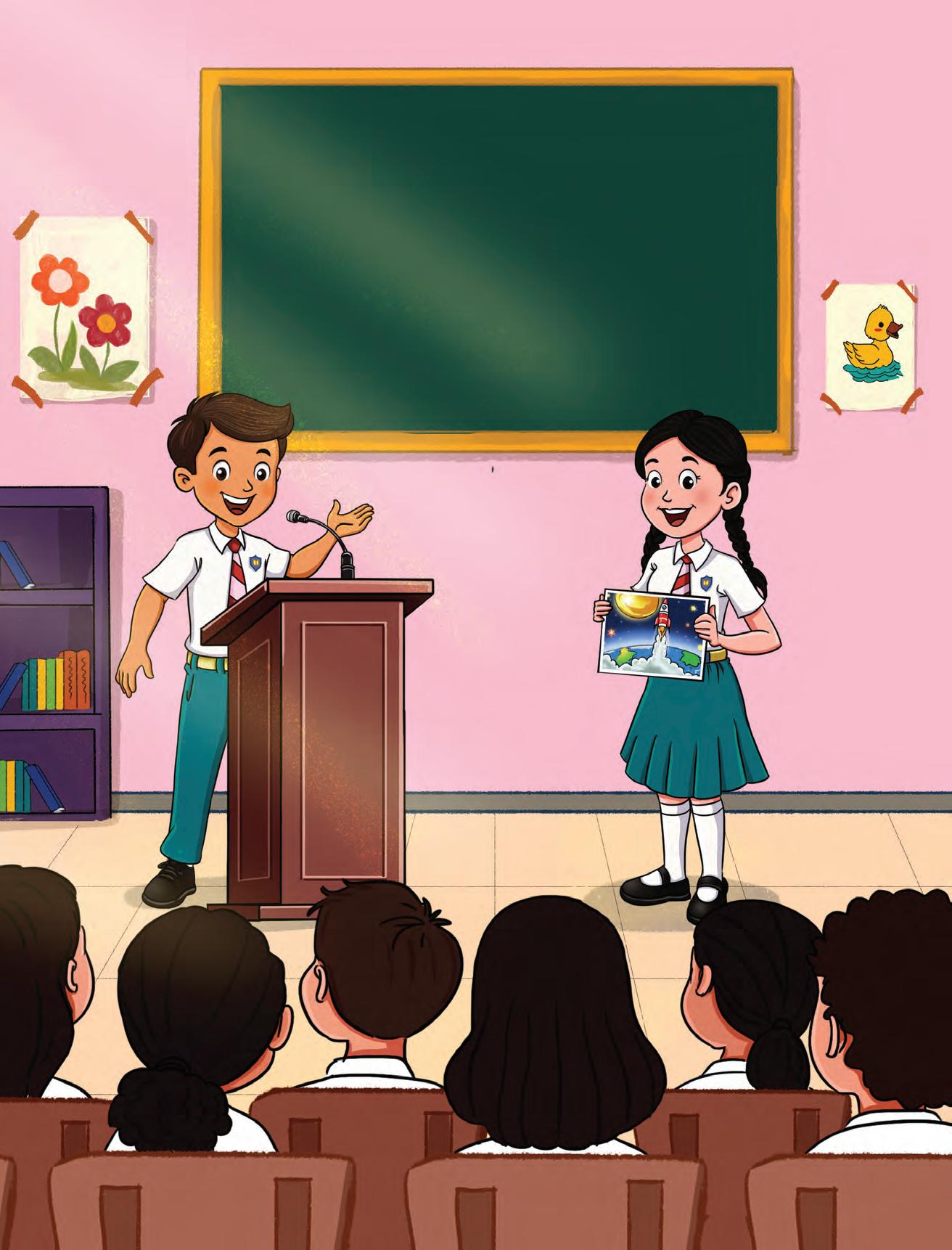
Achieve Fluency in Verbal Communication
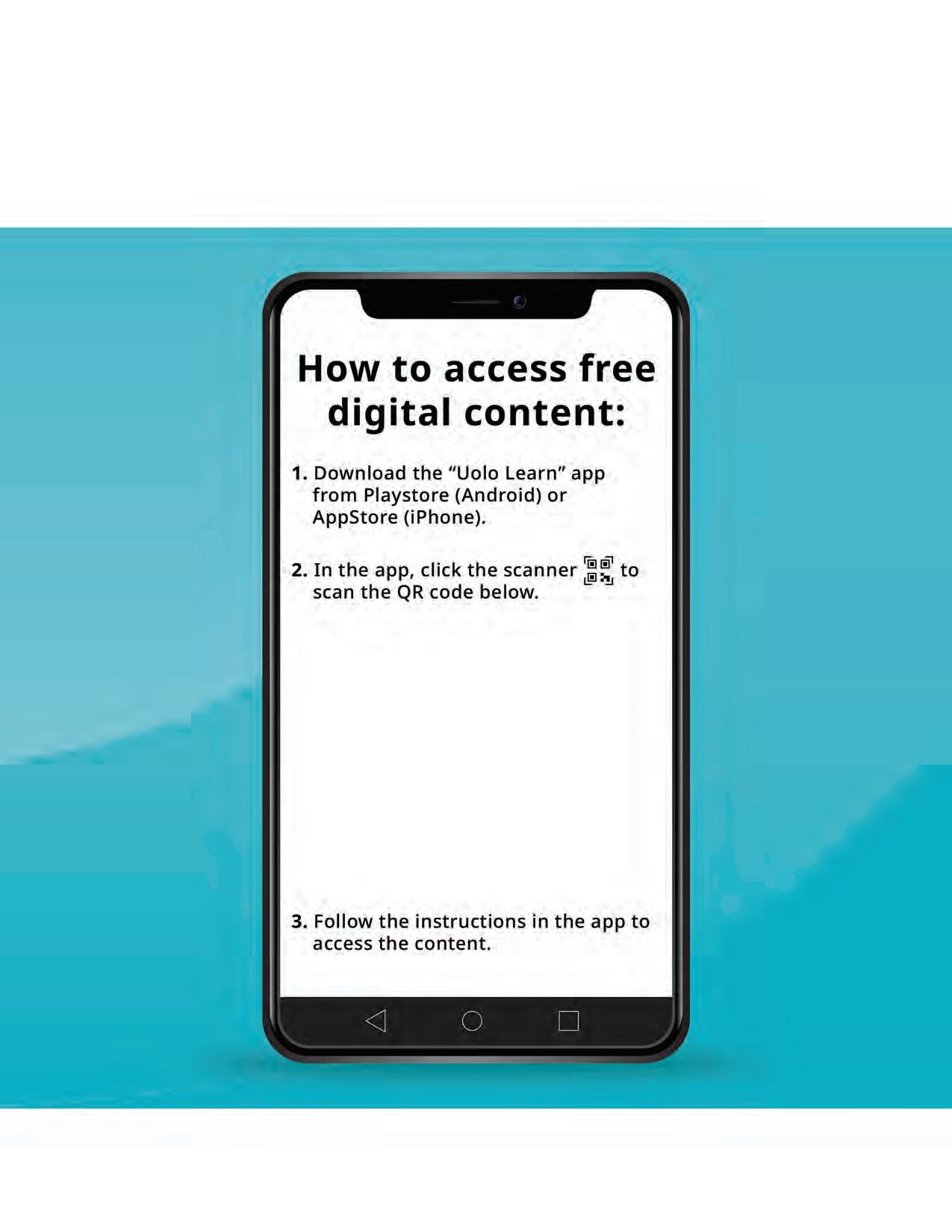
Get access to animated learning videos, interactive quizzes, projects and more — all on the Uolo Learn app!




Get access to animated learning videos, interactive quizzes, projects and more — all on the Uolo Learn app!

Academic Authors: Kashika Parnami, Sneha Sharma, Simran Singh, Arpit Agarwal, Laraine O’Connell
Creative Directors: Bhavna Tripathi, Mangal Singh Rana, Satish
Book Production: Rakesh Kumar Singh
Project Lead: Chandani Goyal
VP, Learning: Abhishek Bhatnagar
All products and brand names used in this book are trademarks, registered trademarks or trade names of their respective owners.
© Uolo EdTech Private Limited
First edition 2026
This book is sold subject to the condition that it shall not by way of trade or otherwise, be lent, resold, hired out, or otherwise circulated without the publisher’s prior written consent in any form of binding or cover other than that in which it is published and without a similar condition including this condition being imposed on the subsequent purchaser and without limiting the rights under copyright reserved above, no part of this publication may be reproduced, stored in or introduced into a retrieval system, or transmitted in any form or by any means, electronic, mechanical, photocopying, recording or otherwise, without the prior written permission of both the copyright owner and the above-mentioned publisher of this book.
Book Title: Speak 2.0 7
ISBN: 978-93-89057-91-1
Published by Uolo EdTech Private Limited
Corporate Office Address:
91Springboard, 3rd Floor
145, Sector 44, Gurugram, Haryana 122003
CIN: U74999DL2017PTC322986
Printed by: Kumar Offset Printer
Illustrations and images: www.shutterstock.com, www.stock.adobe.com and www.freepik.com
All suggested use of the internet should be under adult supervision.
In the age of globalisation and unprecedented technological advancement, English stands as a universally comprehensible medium of communication. It has evolved into one of the essential tools that learners require to thrive in today’s world and secure their future. Studies from across the globe show that English communication skills significantly impact on career prospects and lifelong learning.
Functional and fluent communication skills in English, encompassing the crucial facets of LSRW (Listening, Speaking, Reading and Writing), are pivotal to children’s knowledge acquisition, intellectual, socio-emotional development and lifelong learning.
In particular, robust listening and speaking skills not only form the bedrock of the language learning process but also pave the way for enhanced reading and writing capabilities. Yet, the majority of educational efforts prioritise teaching reading and writing from the very outset, sometimes neglecting listening and speaking skills. These foundational skills are often overlooked in educational institutions due to high pupil-teacher ratios, lack of opportunities to express themselves in English, and most significantly, a lack of structured and dedicated class time for honing these skills.
It is within this context that Uolo Speak 2.0 has been introduced as a groundbreaking English program tailored for learners in pre-primary to grade 8, with a special emphasis on English listening and speaking. In alignment with the National Education Policy (NEP) of 2020 and the learning outcomes set forth by the National Council of Educational Research and Training (NCERT), the books comprise 12 chapters on essential functional skills, with the last three advantage chapters to be used at the teacher’s discretion, depending on learners’ readiness.
The Speak 2.0 book serves as the classroom-based avenue for developing functional speaking skills. The book contains teacher-led English speaking and listening activities that adhere to the highly recommended and research-based teaching-learning method known as the Gradual Release of Responsibility (GRR). This approach systematically guides learners to master the targeted competencies. Through these activities, learners engage in high-quality, age-appropriate and experiential tasks that foster confidence and fluency in English. The accompanying Teacher Manual provides in-depth implementation plans for these activities.
AI lies at the heart of Speak 2.0, powering digital experiences that make learning English speaking dynamic and personalised. The package comes with digital content, provided free of cost, to ensure a seamless and holistic learning experience for children.
The mobile interface ensures consistent practice of functional English skills, while learners participate in speaking tasks enriched with AI-based evaluation and real-time feedback. Acting as a smart companion, AI guides pronunciation, sharpens usage, and enhances accuracy, encouraging learners to practise with confidence. With this seamless blend of AI-driven practice and feedback, learners steadily build fluency and gain the confidence to express themselves effectively in everyday communication.
Uolo Speak 2.0 offers a potent, captivating and unique learning experience for learners. It embodies a pragmatic, results-oriented approach to cultivating indispensable functional English skills required for the 21st century. We extend our warmest wishes to all educators, parents and learners as they embark on this exciting journey with Uolo Speak 2.0, filled with fun and joyful experiences.

Dr Laraine O'Connell
D. Litt., English, North West University, South Africa
I am a veteran English teacher and lecturer, with a great love for English and for teaching. I have taught English and trained teachers over many years. I live in South Africa and it is a wonderful experience working with a company promoting the learning of English in India.
Welcome to the Speak 2.0 journey!
The program is a thoughtfully crafted activities-based learning experience that builds students’ speaking skills in English. The program, with dedicated time and space within the classroom, becomes a platform to practise speaking and listening skills in everyday scenarios. These scenarios are created by way of teacher-led activities, which cater to specific competencies in English.
Coursebook
Speak on the Spot Activities
Prepared-Speaking Activities
Teacher Manual
Student and Teacher Apps
Talking Books
Listening and Speaking Projects
Interactive Practice Quizzes
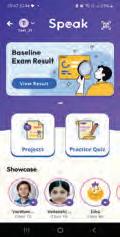
The classroom program is augmented by the digital world, which is presented to the students through the UOLO App. The app includes projects that are closely associated with the activities in the coursebook. The projects allow a fear-free practice time to children at home and are AI evaluated. The app also includes quizzes in listening, speaking, reading and writing that can be done at home.

The National Education Policy (NEP) 2020, introduced by the Government of India, represents a transformative shift in the country’s education system. It aims to create a more holistic, dynamic and multidisciplinary approach to education. NEP 2020 focusses on fostering conceptual understanding, skills, values and competencies that align with the demands of the 21st century, while also preserving India’s rich cultural heritage. UOLO is fully committed to actualising the vision of NEP 2020 by meticulously adhering to its outlined recommendations.



1. Comprehension and understanding
2. 21st-century skills, values and dispositions
CompetencyBased Education
3. Application in real life





4. Holistic and integrated learning
5. Enjoyable and engaging
6. Collaborative and exploratory activities
NEP Pages 12, 17, 22
Teaching and Learning Pedagogy
7. Technology-based solutions
NEP Pages 3, 11, 12, 27
8. Assessment of core concepts and application skills Assessment
NEP Pages 12, 18, 22
Exposure to rich literature, as stories and poems, that demonstrate essential speaking behaviours and competencies.
1 2 3 4 5
Build mastery in new words usage, and expression, while also strengthening phonics skills to lay a strong foundation for reading and pronunciation.
1 2 7
Enhanced listening comprehension and elevated English learning experience through animations that bring each text to life.
1 5 7

Digital projects and supportive platforms that present English speaking opportunities in a fear-free environment.
2 3 4 5 7 8
Classroom activities and presentations that help build confident expression and language usage in everyday scenarios.
2 3 4 5 6 8
1 Comprehension and understanding
2 21st-century skills, values and dispositions
3 Application in real life
4 Holistic and integrated learning 5 Enjoyable and engaging
6 Collaborative and exploratory activities
7 Technology-based solutions
8 Assessment of core concepts and application skills

‘In the 21st century, language teaching must go beyond traditional approaches and must aim to enable students to use language skills in real-life contexts for a wide variety of purposes.’ (NEP, 2020)
According to Vygotsky and Krashen’s theory of second language teaching, language acquisition happens best when learners are engaged in purposeful and meaningful tasks in an anxiety-free, non-judgemental, communication-oriented, input-rich, supportive and stress-free environment, along with a lot of scaffolded practice. This approach to second language teaching is also highlighted by the NIPUN Bharat Mission document and NEP 2020.
In this context, the Speak 2.0 series, along with the learning activities designed in it, can play a crucial role in creating an input-rich environment, employing diverse avenues for speaking practice in a fear-free and non-judgemental setting, coupled with real-time feedback.
The book has been developed based on the ‘Gradual Release of Responsibility’ (GRR) model— a teaching-and-learning model that has been widely recommended by the NEP 2020 and the NCF 2022-23. The GRR has been promoted by educational researchers and practitioners all over the world for its effectiveness in promoting student engagement and a deep understanding of content and skills.
The GRR model includes three steps, each one consecutively shifting the ‘responsibility’ from teachers to learners so that learners become independent users of the language.
I do: The teacher first provides explicit instructions and modelling that initiate the learning process.
We Do: As learners begin to grasp the content and skills, the teacher also begins to shift the responsibility to them, facilitating guided practice where the teacher and the learners participate collaboratively.
You Do: Finally, the learners take full ownership of their learning through independent practice and the application of the skills learnt in the program.
Based on this approach, there are three core instructional models on which the activities work (please refer to lesson plans in the Teachers' Manual for greater clarity). These are:
I do We do You do Listen Echo Express and Repeat (E&R)
Fully guided; Modelled speaking by the teacher
Collaborative; Shared speaking between the learners and the teacher Independent practice and application by the learners
To sum up, the programme has been created to do away with the fear of speaking in English among learners and allowing them to express themselves confidently in English in real-life situations.
The National Curriculum Framework for Foundational Stage (NCF) , released in 2023, is developed based on the vision of the National Education Policy (NEP) 2020, and to enable its implementation. The NCF provides guidelines for designing school syllabi and textbooks in India. It aims to improve the quality of education by making it more relevant, engaging, inclusive, and learner-centric. To achieve this, the NCF has articulated precise Learning Standards through well-defined Curricular Goals and Competency statements. These statements serve to harmonise the syllabus, content, pedagogical practices, and assessment culture, ensuring a cohesive and comprehensive educational experience. Curricular Goals: Curricular Goals are statements that give direction to curriculum development and implementation. They are derived from Aims and are specific to a Stage in Education.
Competencies: Competencies are learning achievements that are observable and can be assessed systematically. These Competencies are derived from the Curricular Goals and are expected to be attained by the end of a Stage.












C-1.1 Converses fluently and meaningfully in different contexts
CG-1 Students develop oral language skills using complex sentence structures to understand and communicate abstract ideas.












C-1.2 Describes an outline of the material that has been read out and answers questions related to it












C-1.3 Summarises core ideas from the material that was read out












C-1.4 Demonstrates the ability to speak their reasoning coherently












C-1.5 Makes oral presentations (class debates, short welcome notes, anchoring of small events, short speech, and so on)














C-4.1 Uses knowledge of homophones, word roots, affixes, suffixes, synonyms, and antonyms
CG-4 Students acquire a more comprehensive range of words in various contexts (of home and school experience) and through different sources.




C-4.2 Discusses meanings of words and develops vocabulary by listening and reading a variety of texts or other content areas
1 Sharing and Undestanding Feelings
2 Expressing Aspirations and Goals
3
Conversations of Personal Interest
4
Sharing an Experience
5 Presenting Important Details
6
7
Requesting and Complaining Formally
Conveying a Message
Share personal feelings about something Understand a person’s feelings in different situation
Talk about one’s future goals or dreams using clear and complete sentences
Express admiration for or inspiration from a role model using appropriate vocabulary
Listen to the other person attentively during a conversation
Participate actively in conversations of personal interest
Recount an experience with vivid details and expressions
Describe an event in a sequential order
Identify key details from a news report
Present important details about events
Make a formal request politely, clearly and coherently Make a formal complaint using appropriate body language and tone
Take a message for someone
Convey a message concisely and precisely 8 Making and Adjusting Plans
Discuss and make simple plans using time-related phrases
Confirm, change or cancel plans politely, and respond appropriately when someone agrees, disagrees or suggests a change 9 Giving a Summary
Summarise informational texts using concrete details and key ideas
Summarise fictional texts in a crisp and clear manner
Express one’s point of view on a topic, with reason
Infer someone’s point of view on a topic 11 Expressing Opinions
Agree with an opinion using adequate reasoning
Disagree with someone’s opinion, using polite expressions and logical reasoning
Presenting a Social Campaign
Create a social campaign with a key message, a catchy tagline and a call to action
Present the social campaign confidently and persuasively


Talking Book: Animated video of the text
Keywords: Keywords from the text with meaning and pronunciation

Talk Toolkit: learners with essential vocabulary and language structures for the targeted speaking competency
E-Speak 1: A series of three guided speaking projects on the mobile app
Gaming Zone 1 and 2: Fun activities aligned with the big skill









Speak on the Spot: Impromptu speaking activity to be done in the classroom
E-Speak 2: A short, open-ended, assessment-type project on the mobile app
Speaking prompts with no expectation of writing




Practise: Guidance on how to practise at home
Tips: Helpful points for better speaking





A classroom presentation to be made after thorough planning and preparation
Template for drafting the presentation,





Reflection Journal: A template for reflecting on the achievement of the





How do you feel after scoring fifty runs?

I feel happy and proud because my hard work has paid off.
Talking Book








In this chapter, I learnt . New words I learnt:
Share your feeling on how you felt when your best friend/parents surprised you on your birthday.
How confident do I feel about sharing my feelings and understanding others’ feelings?




I aspire to play cricket for my country one day.
Talking Book














Hey! Do you love playing cricket?

Yes, I bat really well. My mom gave me this bat as a gift.
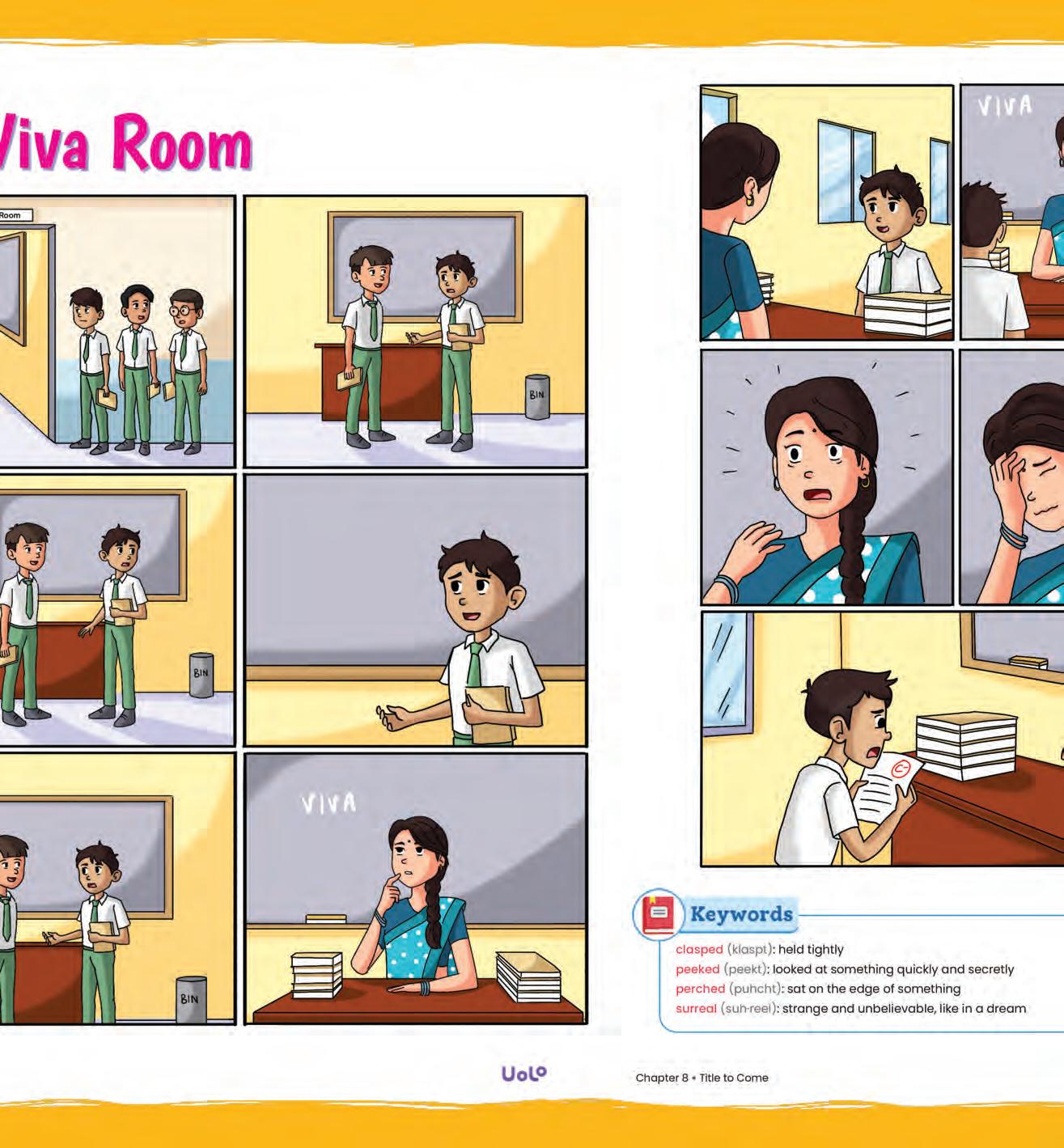
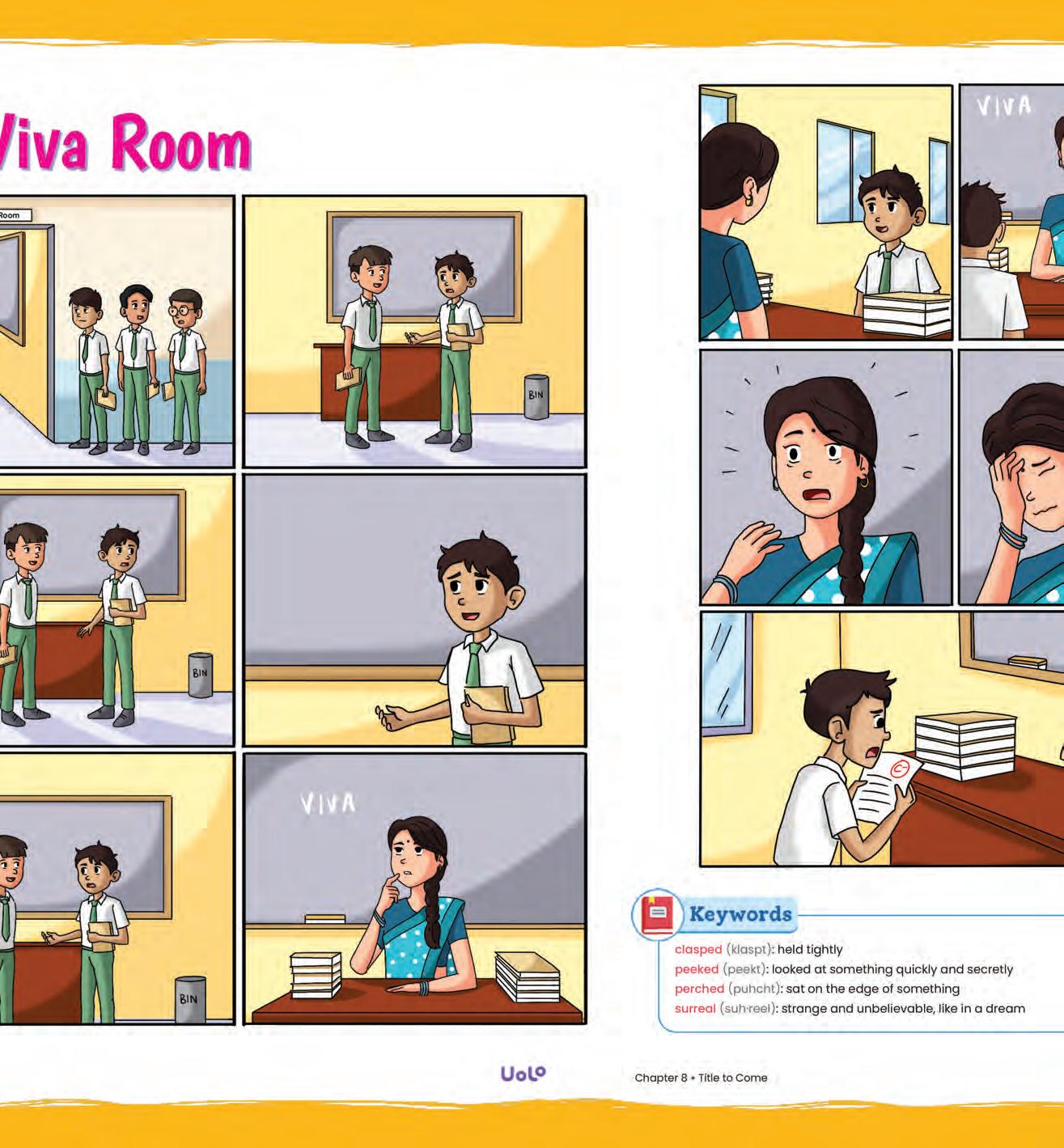


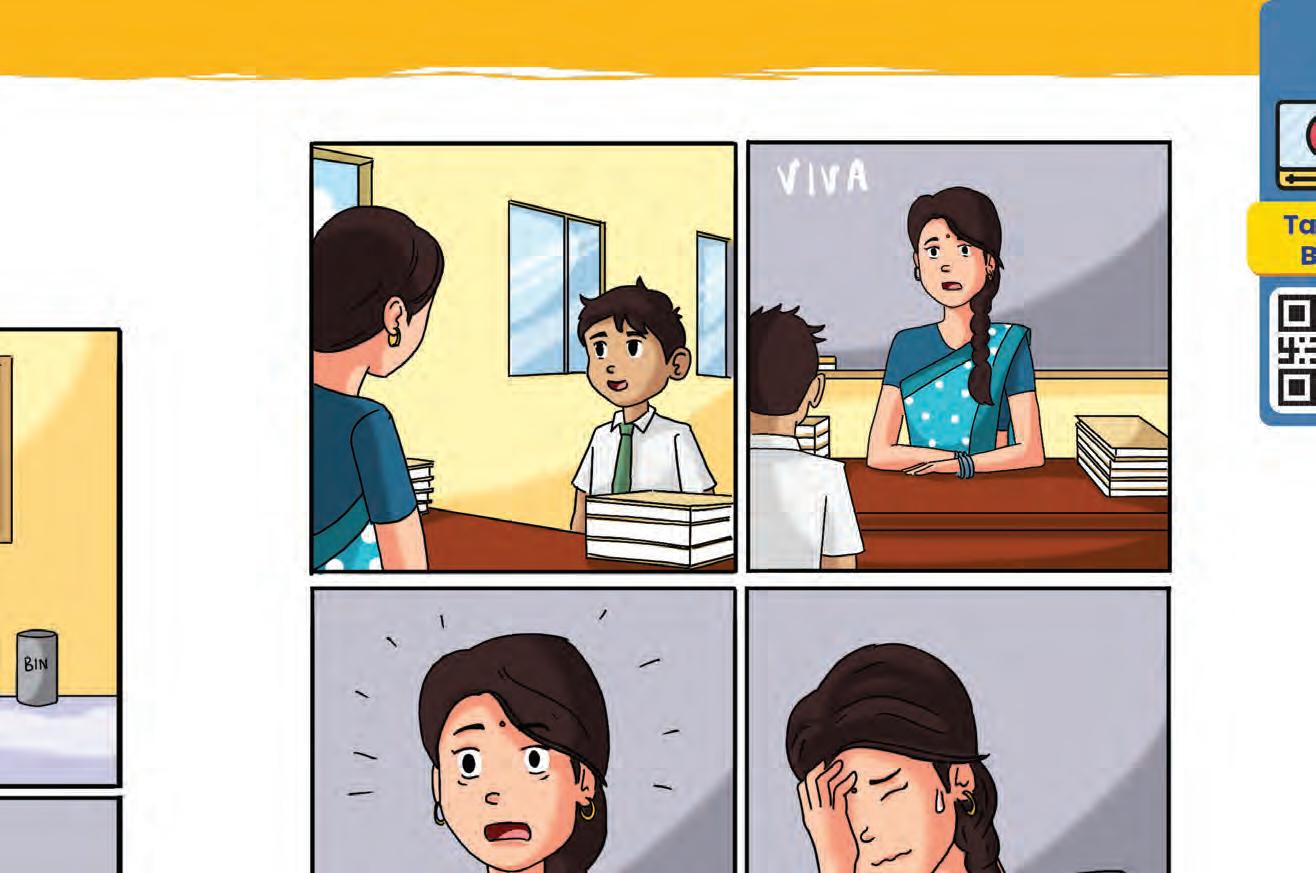
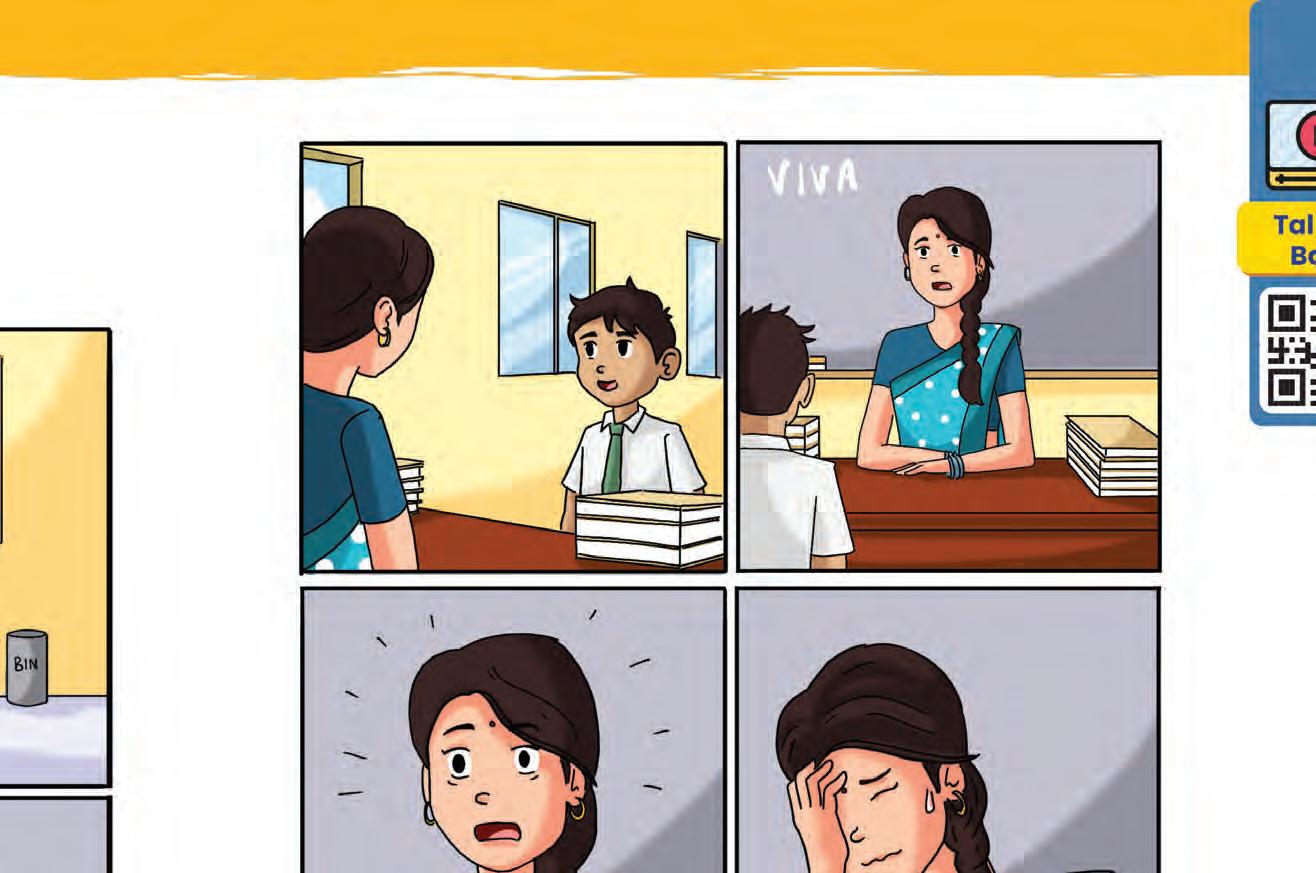
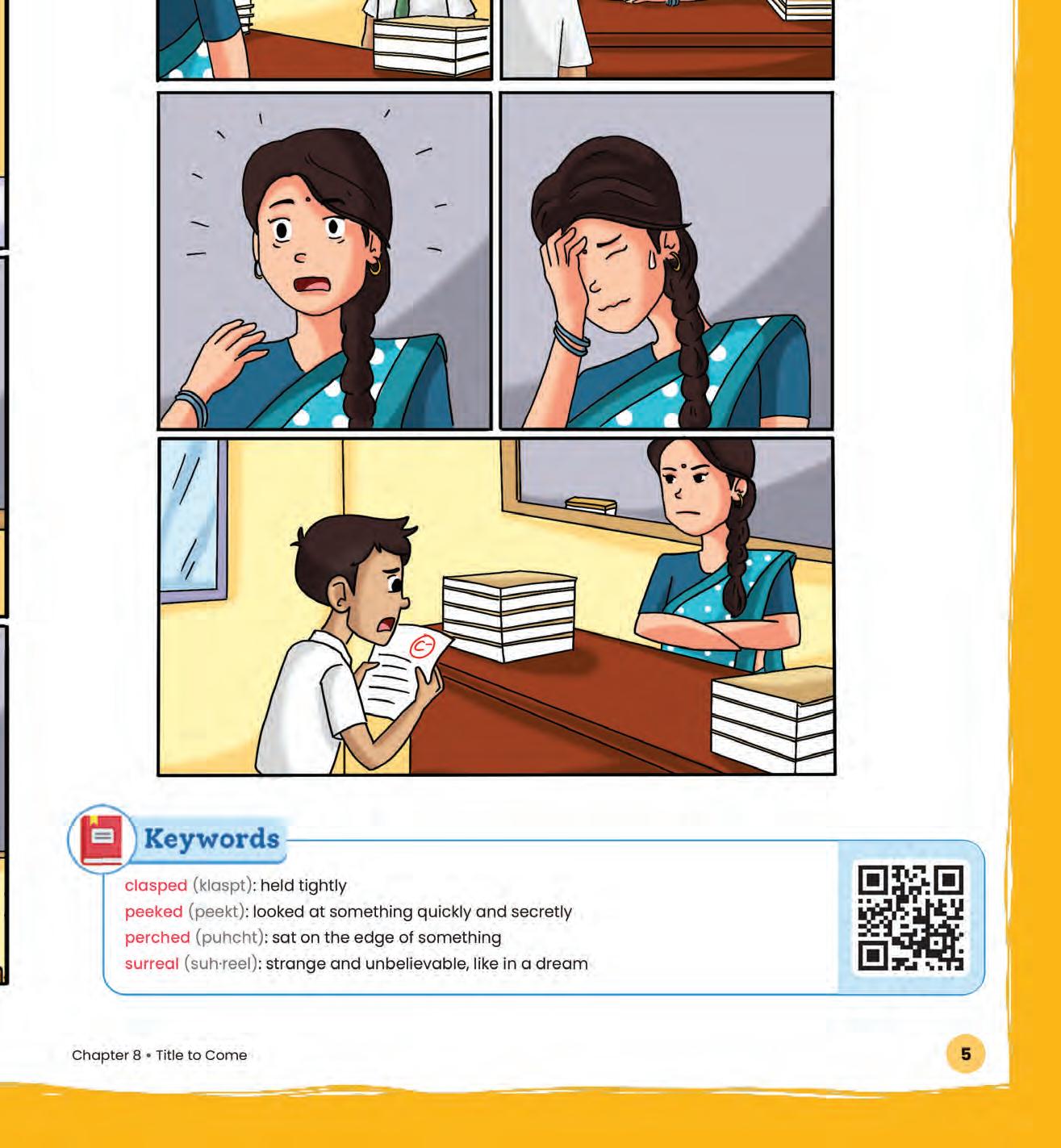












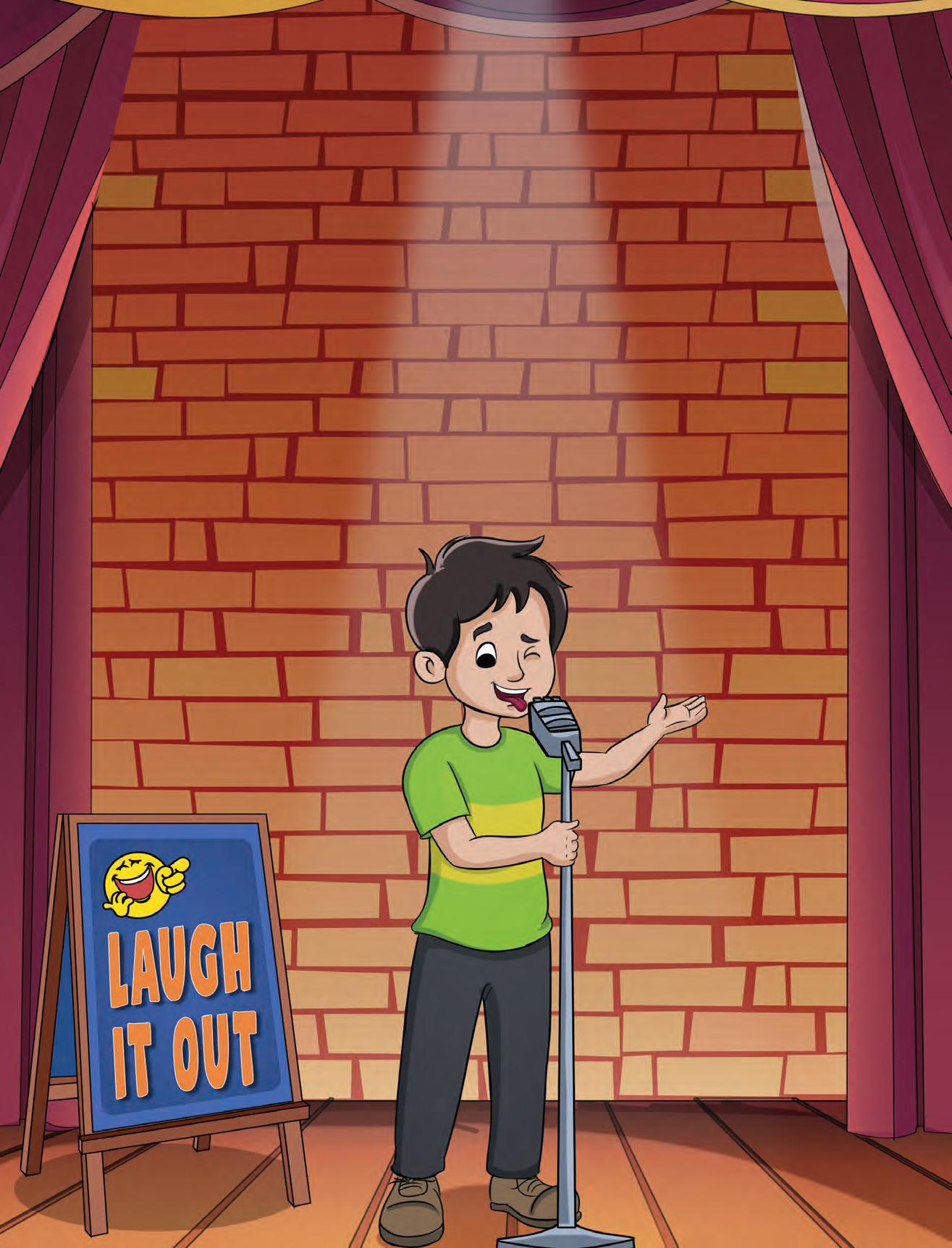
One day, I tried a pencil trick in class.
Luckily, I caught it—and we all laughed in relief. It spun right towards my teacher’s juice glass!
Talking Book









Suhani, always wear a mask when you go out.

Air quality has dropped to an unsafe level.
Okay, father.
Talking Book


New Technology to Clean Ocean
Plastic Launched
Scientists Develop New Vaccine for Rare Disease
Jaipur Literature Festival Opens with International Authors
Wildlife Sanctuary in Kerala Sees
Record Number of Visitors
Cyclone Hits Odisha Coast
Causing Heavy Damage
Indian Men’s Hockey Team Wins Asian Championship

Culture and Festivals
Environment and Wildlife
Technology
Science and Discoveries
Sports
Natural Events



(2–3 important points) (end with a highlight of the event)
Hello everyone! I am here to report on the . It happened on in . It was organised by . In the end, . Thank you! (topic) (date) (place)
3
Practise: Share your report with family and friends. Present it with enthusiasm.
4
Present: Now, it’s time to present the report to your class!


Use phrases from Talk Toolkit to frame sentences. Use hand gestures and facial expressions. Look at your classmates while presenting the report.

In this chapter, I learnt to . New words I learnt: You watched a news report about a famous personality visiting your town for an opening ceremony. You and your family attended the event. Write 4–5 sentences about the event and give key details.
How confident do I feel presenting important details about events? 1 I need help. 2 I think I can do it. 3 I feel confident.


Good morning, sir. Could you please arrange a summer camp?

Okay, I will consult the teachers about it.
Talking Book










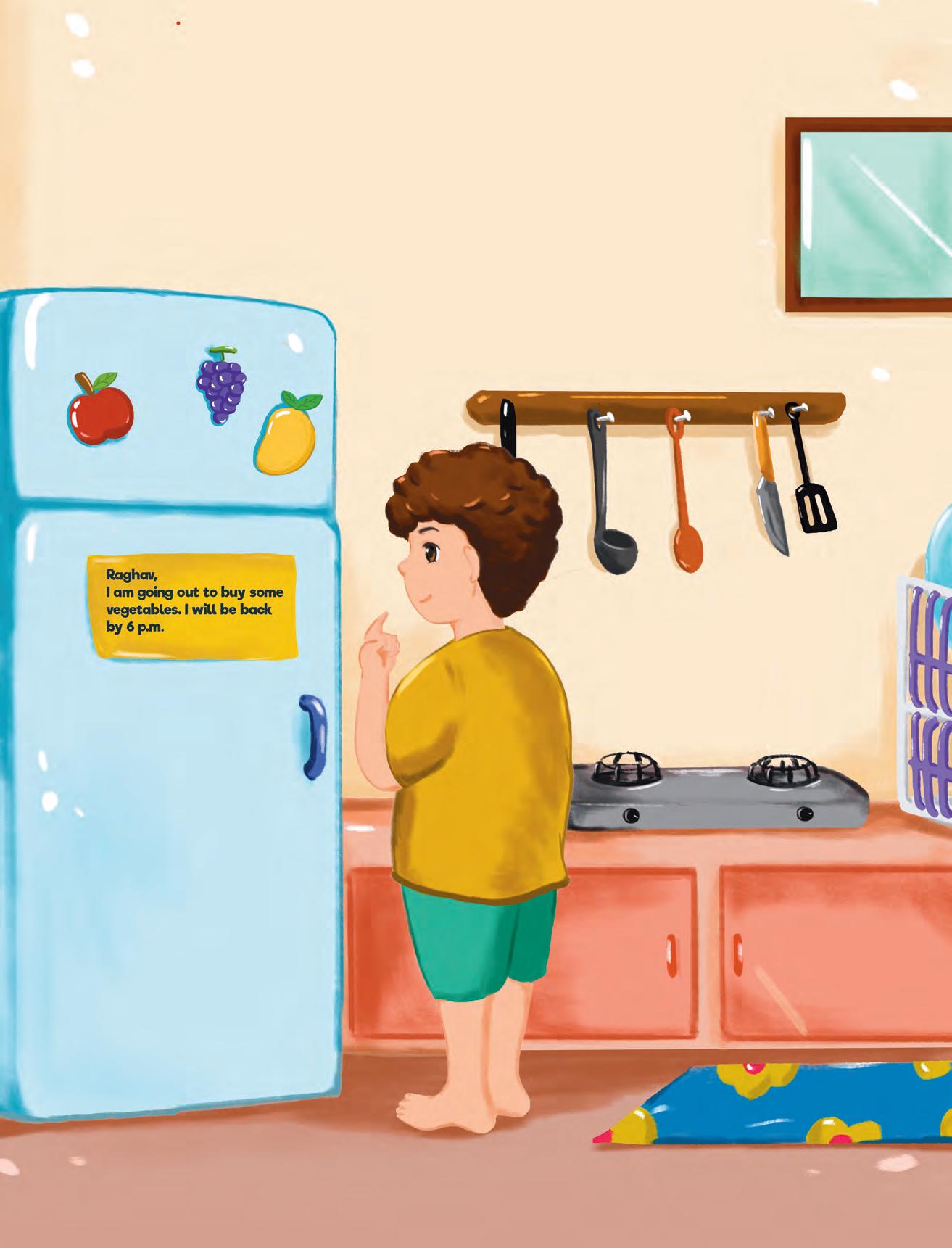
Talking Book

May I take the message for [Name]?
Would you like me to pass on a message to… ?
Do you want me to let [Name] know you called?
Should I tell [Name] you reached out?
I have received a message from [Name]
This is [Name]’s message for you…
[Name] asked me to tell you…
[Name] wants to let you know that…

Hello, my mother has gone to the market. May I take the message for her?/ I’m sorry, he’s not here. May I take the message for our house help?
Would you like me to pass on a message to my teacher?/ Would you like me to pass on a message to Ridhi?
Do you want me to let Shyam know you called?/ Do you want me to let your mom know you called?
Should I tell Dad you reached out?/ Should I tell your friend you reached out?
I have received a message from your trainer./ I have received a message from your office.
This is Riya’s message for you—she’ll be late for the meeting./ This is Rahul’s message for you—he’s waiting in the lobby.
Neha asked me to tell you she’ll be here at 4 p.m./ The teacher asked me to tell you to attend the PTM next week.
Dad wants to let you know that he’ll pick you up today./ Ritu wants to let you know that she really liked your gift.





In this chapter, I learnt to . New words I learnt:
Your friend called to inform you that he will be absent from school tomorrow because he is unwell. He requested you to inform the teacher about his absence. Write in 4–5 sentences the message you will convey to your teacher.









the roles and responsibilities of the organising team
3

4


a rough draft on the order of performance
a list of chief guests/judges we should invite a list of participants for the event themes for the campaign posters to inform everyone
Sure! Thank you, ma’am. Excellent! Let’s meet a few days before the event to see the progress.
Practise: Practise the dialogue with a family member or a friend.
Present: Now, present it in class.


Speak clearly and confidently.
Speak in full sentences. You can give your own answers.



In this chapter, I learnt to . New words I learnt: Your friend had planned a video game day on Saturday. Something urgent came up and you have to request for some adjustment to the plan. Write your request for adjustment in 4–5 sentences.
How confident do I feel in making plans, suggesting changes and adjusting them when needed?
I need help.
I think I can do it.
I feel confident.

To sum up, while winter has shorter and colder days, summer has longer and warmer days.
Talking Book










Why should the canteen stop selling junk food if students like it?
That is because junk food harms our health. Healthy food choices help us stay fit, focussed and active throughout the day.
Talking Book

In my opinion, … In my opinion, online learning is helpful, but classroom learning is more fun./ In my opinion, reading storybooks is the best way to improve your language.
From my perspective, ...
My understanding is that...
I think/believe that…
I strongly feel that...
I would like to add that...

From my perspective, recycling helps save natural resources./ From my perspective, saving money is important for the future.
My understanding is that teamwork means sharing ideas and helping each other./ My understanding is that social media should have age restrictions up to the age of 16.
I think that everyone should learn basic first aid./ I believe that hard work is more important than talent.
I strongly feel that animals should be treated with kindness./ I strongly feel that physical fitness is as important as academics.
I would like to add that we must save electricity at home./ I would like to add that teachers also inspire us to dream big. It looks/sounds like they believe...
From what they said, I understand that...
Their point of view...
It sounds like they believe art is just as important as science./ It looks like they believe technology has made our work easier.
From what they said, I understand that saving water is everyone’s duty./ From what they said, I understand that waste management helps in the progress of SDG goals 6, 7 and 15.
Their point of view seems to be that social media can both help and harm./ Their point of view is that students should have more practical learning instead of just theory.







Many students spend too much time on mobile phones playing games. This may harm their eyes.
That is true, but students not only use mobile phones to play games but also to read educational material online.
Talking Book










Talking Book










Join me in .
(call for action)
taking part in the ‘Go Green’ campaign
Thank you!
making small changes every day to save our planet spreading awareness about protecting the Earth



This SPEAK 2.0 book aims to systematically build English language skills in learners and enable them to verbally express themselves in real-world situations. Each chapter focusses on building specific English language competencies and weaves together activities that are research-based, age-appropriate, contextual, experiential and joyful. The activities adhere to the highly recommended and research-based teaching-learning method known as the Gradual Release of Responsibility (GRR), which has been endorsed by the NEP 2020 and the NCF 2022–23. Through the series, learners receive dedicated time and space within the classroom to express themselves in English which helps them in becoming confident speakers of the language.
• Activity-Based Learning: The book offers joyful experiential activities that build English communication competencies.
• Texts per the NEP 2020 Themes: The book has exciting and stimulating texts that pave the way for English communication activities.
• Tech Integration: The book works in sync with our digital component, where various other activities and projects are undertaken. Learner outputs are evaluated through an AI-based speech recognition engine.
• Teachers’ Manual: The book is complemented by the Teachers’ Manual that enables teachers to conduct each session effectively.
Uolo partners with K-12 schools to provide technology-enabled learning programs. We believe that pedagogy and technology must come together to deliver scalable learning experiences that generate measurable outcomes. Uolo is trusted by over 15,000+ schools across India, Southeast Asia and the Middle East.
ISBN 978-93-89057-91-1



